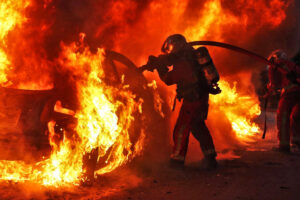It is grimly appropriate that the riots across France started when the police shot a young man in Nanterre. Nowhere epitomises France’s last few decades of social and political change better than this suburb of western Paris. The English word evokes privet hedges and neighbourhood watch schemes; but in France, the bourgeoisie largely live in the centre of town and the poor in the suburbs, or banlieues. The division is particularly marked in Paris where the middle-class take the metro, while the working class rely on RER trains, which connect the city to the suburbs. When factories were built in the 20th century, they were concentrated in a ring around the capital. After 1945, that ring became the fiefdom of the Communist Party; when you walk, today, through the Place Lénine or the rue Youri Gagarine, you know you are in the banlieue rouge. For 60 years after the Liberation, all mayors of Nanterre were Communists. The current incumbent, first elected in 2004, used to be one, too, but now describes himself as the representative of “various Lefts”.
The collapse of French Communism, which started slowly in the Seventies and accelerated in the Nineties, has had important effects on the banlieues. The party was never in a position to form a government — even when, in the late Forties, it was the largest party in France. Other parties allied to keep the Communists away from power and, in the Fifties, its intellectual supporters, disgusted by revelations about Stalinism and the Soviet invasion of Hungary, tore up their membership cards. However, the working classes — always, one suspects, a bit more hard-headed about the uses and abuses of Stalinism — largely stuck with the Communist Party. Though it never stood a chance at national power, it did rule in its own little worlds. Party militants, with almost unlimited energy for tedious and thankless tasks, did much to hold communities together.
Then came de-industrialisation, which infected Europe just as Communism ceased to be a global movement: the same year the Soviet Union was formally dissolved, the Renault factory at Boulogne Billancourt, once a bastion of working-class power, closed. Five miles away, Nanterre became the epicentre of another development that shook the world of French Communism: immigration. In the Sixties, a large bidonville (shanty town) sprang up there, dominated by North Africans on the western side and Portuguese on the eastern. At first, this had almost no effect on the politics of the area. Immigrants did not vote, and were rarely organised enough to mobilise in any other way. However, as they — or, in recent years, their children and grandchildren — became more established, things changed.
The Communist Party had been successful in establishing support among earlier generations of immigrants. The Italians, Portuguese and Spaniards fitted fairly easily into the political culture of the French Left and had, in some cases, left their homes to escape Right-wing oppression. Immigrants from outside Europe, especially Muslims, posed more awkward problems for the party, since they tended to be culturally conservative. In areas where they were numerous, Communist mayors sometimes argued against providing them with accommodation.
Meanwhile, the French Left itself changed, largely thanks to the University of Paris branch that was established in 1964, at Nanterre. This was the campus where Franco-German student leader Daniel Cohn-Bendit ostensibly pursued his studies, and the birthplace of the student movement of 1968 — which dealt a severe blow to French Communism. Workers, against the advice of Communist leaders, supported the students, launching the most significant general strike in French history — probably, in fact, in the history of any country. Workers, however, were not really the winners of 1968. Students achieved some tangible, lasting benefits, while workers got only a few short-term benefits, in terms of pay. There was no transformation of their lives, and the futility this bred caused Labour militancy to drop off sharply in the Seventies; there were more strikes in the UK, and indeed the United States. In the long term, 1968 helped create a Left that revolved around things like culture, sexuality or environmentalism, rather than the working class.
At first, the beneficiary of these changes was François Mitterrand, leader of the Parti Socialiste, who was elected in 1981. Now, the most prominent defector from Mitterrand’s party represents a post-class Left. Emmanuel Macron is Left-wing in terms of style — he looks as though he would be more at ease rolling a spliff than loading a hunting rifle. And he was supported as a presidential candidate by Nanterre’s very own Cohn-Bendit. But his economics make Norman Tebbit seem like a Guardian-reading sociology lecturer. Just before the riots, a mother took him aside on an official visit to Marseilles and complained that her son could not get a job. She probably expected sympathy. Instead, Macron offered to take her round the Vieux Port where, he promised, she would find at least 10 vacancies.
Apart from a brief stage at the French embassy in Nigeria, Macron has spent his whole working life in Paris, having taken a tour of its finest educational establishments. In spite, or perhaps because, of his privileged background, Macron understands the lessons of 1968. The first of these is that any French government is more likely to give concessions to students than to the underprivileged. This is partly a matter of class: children of prominent politicians were on the barricades in 1968. But concessions to students are also cheaper.
The second lesson is that the protests of 1968 only began to have a serious impact when the Nanterre faculty was closed, and demonstrations moved into central Paris — occupying the Odéon theatre and the Sorbonne. The present wave of protest has, for now, stayed largely in the poorest neighbourhoods. The targets are generally the very things — bus stops, schools, libraries — that serve those neighbourhoods. There have been some attacks in city centres — notably around Les Halles, just north of Notre-Dame, which feels like a central Paris outpost of the banlieues, because a number of RER lines converge there. But the government has only to close the public transport system if it wants to isolate its poorest citizens.
It is often said that France is a statist country, which is misleading. It implies that the state is homogeneous, unified. In reality, the state encountered by the inhabitants of the banlieues is utterly different from that which exists in the bourgeois quarters of large cities. You can see this in the educational provision. Louis-le-Grand, which Macron attended, is technically a state school but it, like other institutions in central Paris, offers an education that can only be obtained in Britain for fees of 30 grand a year. Its pupils are overwhelmingly bourgeois. A boy born in a rough neighbourhood on an RER line stands a better chance of playing for the Arsenal first team than he does of getting into Louis-le-Grand. Riots will make education in the banlieues harder — teachers already regard working in them for a couple of years at the beginning of their career in the way young people once regarded military service. Now they will be ever keener to escape. The state provision of almost everything will be, even more than before, inferior to that in privileged areas.
The attack on the house of the mayor of L’Hay les Roses, a suburb in southern Paris, will have a similar effect. Even before the riots, mayors had begun to withdraw from public life. In the old days, Communist municipal politicians would have gritted their teeth and carried on. They were, after all, hardened to abuse and used to physical danger; some had lived through the occupation. These days, between 400 and 500 mayors resign each year. The figure has increased sharply in the last decade. The best-known recent example is Yannick Morez, the mayor of Saint-Brevin, in the Loire Atlantique, who stepped down after being physically attacked for supporting the installation of a refugee shelter.
Morez is not, though, a mayor in the banlieues, and the attacks on him came from the extreme Right, not from young rioters. Herein lies another lesson from 1968. The protests then were spectacular: France came to a halt for over a month and de Gaulle seemed to teeter on the edge of resignation. What happened next? A crushing victory for the Gaullists in the parliamentary elections and then 13 years of Right-wing government. The rioters of these last few days are numerous, but they are a minority, and the Left-wing intellectuals who express their sympathy for them are an even smaller minority. Alongside the privileged inhabitants of the beaux quartiers and the underprivileged inhabitants of the banlieues, there is a third France. It is made up largely of white people who live in what sociologists call périurbain regions.
For the British, small-town France conjures up an agreeable picture of walking home in the morning with a warm baguette. But this is a fantasy. Bakeries are closing. Shopping means stocking up the freezer at a hypermarket. People who cannot afford to live in town centres are isolated and dependent on their cars — which is why high petrol prices are so often a cause of anger. It was these people who supported the yellow vest protests, and it is generally these people who support the far-Right of Marine Le Pen and Éric Zemmour. They may be the former industrial workers who might once have voted Communist. But watching the banlieues go up in flames is unlikely to arouse liberal sentiments among them.
Though he will be roughly the same age that Charles de Gaulle was in 1940, Macron will be prevented by the French constitution from running for a third term in 2027. His movement, En Marche, is not the kind of structured organisation that will produce an obvious successor. This will leave a big political opening. My guess is that both the far-Left and the far-Right will exploit it — but, as ever, the Left will make the noise and the Right will win the votes.
After all, both have changed. On the Right, Marine Le Pen has done much to tone down her movement’s radicalism, to make it seem less threatening to centrist conservatives. On the Left, Jean-Luc Mélenchon’s La France Insoumise has associated itself strongly with discontent in the underprivileged areas. Mélenchon himself has said “the police kill” and talked about “insurrection” — a word that implies a rebellion that falls short of revolution, which not even the communists will champion now. The Communist Party, or what remains of it, has not associated itself with the violent rebellion in the banlieues.
Not that doing so would serve the Left. Across France, if a candidate says anything that suggests sympathy with riots, looting or crime, they will hand votes to the Right, who now have a useful shorthand. Ronald Reagan said that when running for governor of California in the Sixties, he found that the single word that served his purposes best was “Berkeley”. Right-wing candidates in the French presidential election of 2027 may find that their magic word is “Nanterre”.
Disclaimer
Some of the posts we share are controversial and we do not necessarily agree with them in the whole extend. Sometimes we agree with the content or part of it but we do not agree with the narration or language. Nevertheless we find them somehow interesting, valuable and/or informative or we share them, because we strongly believe in freedom of speech, free press and journalism. We strongly encourage you to have a critical approach to all the content, do your own research and analysis to build your own opinion.
We would be glad to have your feedback.
Source: UnHerd Read the original article here: https://unherd.com/



